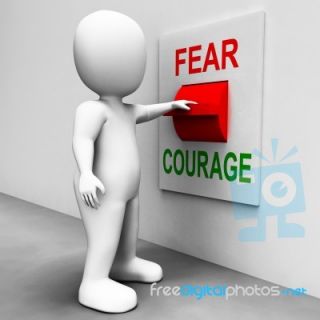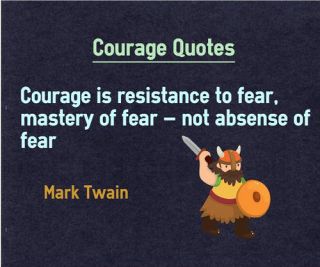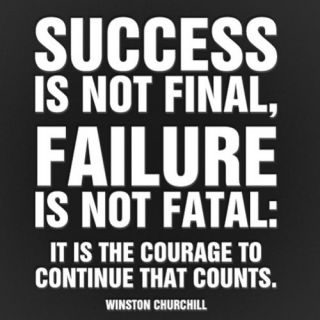Fear
The Complex Emotion of Courage: Do You Really Understand It?
The wisest things said about courage are steeped in ambiguity and paradox.
Posted October 21, 2015

To most of us, courage is little more than confronting a dangerous situation without flinching. The individual exhibits valor and bravery: is fearless, assured, dauntless. In the vernacular, such people might be considered “gutsy”—even as, well, “cocky.” And undeniably, we view courage as what heroes are made of. But, to begin to question the many conventional assumptions surrounding this attribute, let’s take a look at the following quote:
“A coward is a hero with a wife, kids, and a mortgage.” (Marvin Kitman)
So maybe there’s more that’s relative about the term courage—and its first cousin, heroism—than meets the eye. Moreover, consider this quote:
“Courage is nine-tenths context. What is courageous in one setting can be foolhardy in another, and even cowardly in a third.” (Joseph Epstein)
What I’ll be doing in this post is making some fundamental observations about the state of mind, emotion, and spirit that accompany the supposedly admirable trait of courage. And in many ways writers have commented on these counter-intuitive features for millennia. Among a variety of things that I’ll be illustrating, what I think this post will help you realize is that courage cannot exist without its being coupled with fear, and also that the term (contrary to what most people assume) is morally neutral—at times frustratingly ambiguous, even negative.
As regards fear as actually a prerequisite for courage, I emphasized this curious circumstance in an earlier post, entitled “Courage in Relationships: Conquering Vulnerability and Fear.” There I remarked that “without a moment’s hesitation before taking on something felt to be hazardous, the act would exemplify not so much courage as foolhardiness or mindless impulsivity.” So it’s the inner resolve not to be governed by fear that makes courage a quality universally admired.
Here’s what different authors have noted—often paradoxically—about this fear/courage phenomenon:
“Courage is not the absence of fear, but rather the judgment that something else is more important than [the] fear.” (Ambrose Redmoon) [And this seminal quote elegantly makes the point that when we decide to act courageously, it’s because we’ve already determined that the risk, danger, or precariousness of doing so is worth it. It’s truly about having the “courage of our convictions,” “putting our money where our mouth it,” and who knows how many other common expressions that address our willingness to show fortitude in the face of adversity.]
“Necessity does the work of courage.” (Nicholas Murray Butler) [And I take this somewhat ambiguous quote to mean that the values we seek to live by at times necessitate that we overcome our fears through acting with valor.]
“I learned that courage was not the absence of fear, but the triumph over it. The brave man is not he who does not feel afraid but he who conquers that fear.” (Nelson Mandela)
“Courage is never to let your actions be influenced by your fears.” (Arthur Koestler)
“There is no such thing as bravery; only degrees of fear.” (John Wainwright)
“Courage is a peculiar kind of fear.” (Charles Kennedy) [or maybe a peculiar kind of reaction to fear]
“Courage is being scared to death . . . and saddling up anyway.” (John Wayne) [Who else?!]
“Being terrified but going ahead and doing what must be done—that’s courage. The one who feels no fear is a fool, and the one who lets fear rule him is a coward.” (Piers Anthony)

“Courage is resistance to fear, mastery of fear—not absence of fear.” (Mark Twain)
“Courage is doing what you’re afraid to do. There can be no courage unless you’re scared.” (Edward Vernon Rickenbacker)
“When we are afraid we ought not to occupy ourselves with endeavoring to prove that there is no danger, but in strengthening ourselves to go in spite of the danger.” (Mark Rutherford)
“Underneath courage shouts fear, but of a hoarse voice.” (Terri Guillemets) [Which is to say that the courage, by having more inner strength than the fear, is able to overcome it.]
“Speak your mind, even if your voice shakes.” (Maggie Kuhn) [and—possibly—also sounds hoarse (!)]
Just as, in a sense, courage strangely depends on fear, it hinges as well on having a sense of the risk concurrently involved. For example:
“Courage can’t see around corners, but goes around them anyway.” (Mignon McLaughlin) [Note how this quote metaphorically—and succinctly—highlights the fact that risk, too, is intrinsic to courage.]
And examine this quote in which one’s actions (to my mind, at least) don’t really demonstrate courage because they’re compelled by an emotionally extreme state—that is, of desperation—where, subjectively, there’s very little at stake:
“Courage is as often the outcome of despair as of hope: in the one case we have nothing to lose, in the other everything to gain.” (Diane de Poitiers)
More curious than all these quotes are a few that talk about courage not as triumphing over fear but as actually being driven by it. And in these instances, too, it’s questionable whether what appears a courageous act exemplifies courage at all. For it’s principally motivated by the fear that others’ may find you out, that they’ll discover you lack this admirable quality. So if it’s principally your fear of what people might say about you if you don’t act courageously, then—given what’s impelled you to act this way in the first place—your “courage” might, frankly, be better understood as a form of cowardice. Consider the irony embedded in the following quotes:
“Some have been thought brave because they were afraid to run away.” (Thomas Fuller)
“Courage is the fear of being though a coward.” (Horace Smith) And, looked at inversely, we have:
“Perfect courage means doing unwitnessed what we would be capable of with the world looking on.” (François, Duc de La Rochefoucauld) And complementing this quote is a similarly paradoxical one:
“Bravery is being the only one who knows you’re afraid.” (Franklin P. Jones)
To shift our focus to another sub-topic, it might be observed that acts of courage have been linked to perseverance with a frequency perhaps second only to their being associated with fear:
“Courage is fear holding on a minute longer.” (George Smith Patton)

“A hero is no braver than an ordinary man, but he is braver five minutes longer.” (Ralph Waldo Emerson)
And here’s a quote that, further, makes an important connection between perseverance and resilience:
“Courage doesn’t always roar. Sometimes courage is the little voice at the end of the day that says I’ll try again tomorrow.” (Mary Anne Radmacher)
But finally, what is most remarkable about the whole notion of courage is its moral ambiguity. To C.S. Lewis:
“Courage is not simply one of the virtues, but the form of every virtue at the testing point.”
But note that Lewis seems to assume that any situation in which one demonstrates courage warrants being viewed as virtuous. Looked at historically, however, such a conclusion seems ungrounded. For courage per se in neither virtuous nor vicious. Consider that the word derives originally from the Latin cor, meaning heart, signifying not virtuous conduct as such but intrepidity, daring, spiritedness, and bravery in battle (as in, say. Richard the Lionheart). And these attributes could just as well portray villainous as virtuous behavior.
So, as a quality or characteristic, courage can’t really be presumed a virtue. It all depends on how it’s employed—what it’s “in the service of.” In short, it’s morally ambiguous. Here are what some authors have had to say about the (supposed) morality of courage. (And in these instances, since I couldn’t find any famous one-liners on the topic, my quotes here will typically be more lengthy):
“What are we to make . . . of those dedicated Nazis who fought resolutely and well in the last days of World War II when their cause was lost and they knew it? Are they, the murderers of Auschwitz and Buchenwald, to be called courageous, meaning virtuous? . . . Is courage a morally neutral value? This is a puzzling and disturbing possibility” (from Herman L. Sinaiko, Reclaiming the Canon: Essays on Philosophy, Poetry, and History, Yale Univ. Press, 1998).
“I do not believe that courage, by itself, is a moral virtue. It is a personality trait, a matter of temperament; the capacity to face danger, endure pain, or suffer ignominy in pursuit of other ends; and a characteristic that can serve the ends of a pirate, a soldier, a stunt-man, a psychopath, or an athlete, something that could be ascribed to one engaged in any number of activities, including those we might deem morally neutral or even morally reprehensible. For example, Churchill’s nemesis, Adolf Hitler, showed ample daring as a courier on the battlefields of Ypres and the Somme. However, few would characterize Corporal Hitler’s actions as exemplifying moral courage” (from Do No Evil by Michael E Berumen, self-published, 2003).
“Hitler was very likely a courageous man. Mafiosi and street gangsters often face death with confidence, as Aristotle would have wished. Yet these are not noble persons; these are moral monsters. So is courage a ‘morally neutral virtue’?” (from “Is Courage a Moral Quality?”, author’s actual name not provided, vulgarmorality.wordpress.com) [and the so-called Vulgar Moralist’s extreme examples obviously answer negatively the question raised by the title of his post].
“Yet courage can also be used for immoral ends, and even elicited by immoral ideals—witness the courage of the terrorist or Nazi soldier. In such situations we say that a good is being used for evil” (from Mike W. Martin’s Happiness and the Good Life, Oxford Univ. Press, 2012).
“Courage . . . can exist in wholly immoral people, even someone unmitigatedly diabolical” (from Kevin Timpe & Craig A. Boyd’s Virtues and Their Vices, Oxford Univ. Press, 2014). And lastly,
“What is good about [courage and conscientiousness] need imply no commitment to moral standards, and their possession is consistent with gross immorality. . . . Such non-moral traits can also contribute to success in immoral projects in a way moral virtues cannot” (from Robert Audi’s, Reasons, Rights, and Values, Cambridge Univ. Press, 2014).
In conclusion, it’s no easy task to fully comprehend the multifaceted and at times contradictory nature of courage. Still, exploring the many varied quotes that—from the Greeks on—have “valiantly” sought to characterize it, can help us grasp its many rarely recognized complexities.
NOTE 1: This post concludes a series of three related posts on courage, the first being specifically on relationship courage and the second on moral courage. Here are their titles and links: “Courage in Relationships: Conquering Vulnerability and Fear” and “Kim Davis, Pope Francis, and the Moral Ambiguity of Courage.”
NOTE 2: If you’d like to review my writings generally for Psychology Today online—on a broad variety of topics—click here.
NOTE 3: On the chance that you found this piece both interesting and instructive, I hope you’ll consider forwarding its link to others.
© 2015 Leon F. Seltzer, Ph.D. All Rights Reserved.
---To be notified whenever I post something new, I invite readers to join me on Facebook—as well as on Twitter where, additionally, you can follow my frequently unorthodox psychological and philosophical musings.




